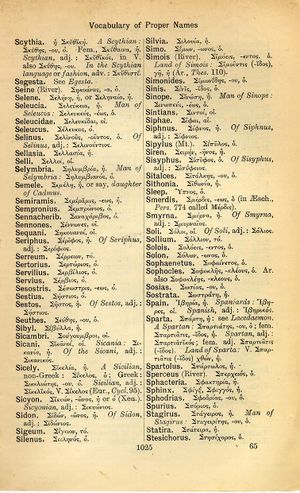Sisyphus: Difference between revisions
Λήσειν διὰ τέλους μὴ δόκει πονηρὸς ὤν → Latere semper posse ne spera nocens → Gewiss nicht immer bleibst als Schuft du unentdeckt
(Names) |
(6_15) |
||
| Line 3: | Line 3: | ||
<b class="b2">Of Sisyphus</b>, adj.: Σισύφειος. | <b class="b2">Of Sisyphus</b>, adj.: Σισύφειος. | ||
}} | |||
{{Lewis | |||
|lshtext=<b>Sīsyphus</b>: ([[anciently]] Sīsŭpus and Sīsĭpus; the [[last]] in Inscr. R. N. 4472 Momms.; cf. Ritschl, Monum. Epigr. Tria, p. 26), i, m., = [[Σίσυφος]]>.<br /><b>I</b> Son of Æolus, [[king]] of [[Corinth]], [[famous]] for his [[cunning]] and robberies. He [[was]] killed by [[Theseus]]. His [[punishment]] in the [[infernal]] regions [[was]] to [[roll]] a [[stone]] up [[hill]] [[which]] [[constantly]] rolled [[back]] [[again]], Hyg. Fab. 60; Serv. Verg. A. 6, 616; Poët. ap. Cic. Tusc. 1, 5, 10; Ov. M. 4, 459; 4, 465; 13, 26; Prop. 4 (5), 11, 23; Hor. C. 2, 14, 20; id. Epod. 17, 68 al.: Ulixi Sisyphique [[prudentia]], Cic. Tusc. 1, 41, 98; cf. [[vafer]], Hor. S. 2, 3, 21.—Hence,<br /> <b>1</b> Sīsy-phĭus, a, um, adj., of or belonging to [[Sisyphus]]: labores, Prop. 2, 17 (3, 9), 7; 2, 20 (3, 13), 32: [[cervix]], Sen. Herc. Oet. 942: [[portus]], i. e. [[Corinth]], Stat. Th. 2, 380: [[Isthmus]], of [[Corinth]], Sil. 14, 51: [[opes]], i. e. of [[Creusa]] (as [[daughter]] of [[Creon]], [[king]] of [[Corinth]]), Ov. H. 12, 204: [[Ulixes]] [[sanguine]] [[cretus]] Sisyphio ([[because]] [[Sisyphus]] seduced [[Anticlea]], the [[mother]] of [[Ulysses]], [[before]] her [[marriage]] [[with]] [[Laertes]]), id. M. 13, 32; cf. Serv. Verg. A. 6, 529.—*<br /> <b>2</b> Sĭsyphēïus, a, um, adj., of [[Sisyphus]]: vincla, i. e. the [[marriage]] [[with]] [[Sisyphus]] (of his [[wife]] [[Merope]]), Avien. Arat. 597.—<br /> <b>3</b> Sīsyphĭdes, ae, m., [[offspring]] of [[Sisyphus]]: [[Ulysses]] (v. [[supra]], 1.), Ov. A. A. 3, 313.—<br /><b>II</b> A [[dwarf]] of M. Antony, so named by him [[because]] of his [[shrewdness]]. Hor. S. 1, 3, 47 Schol. | |||
}} | }} | ||
Revision as of 09:07, 13 August 2017
English > Greek (Woodhouse)
Σίσυφος, ὁ.
Of Sisyphus, adj.: Σισύφειος.
Latin > English (Lewis & Short)
Sīsyphus: (anciently Sīsŭpus and Sīsĭpus; the last in Inscr. R. N. 4472 Momms.; cf. Ritschl, Monum. Epigr. Tria, p. 26), i, m., = Σίσυφος>.
I Son of Æolus, king of Corinth, famous for his cunning and robberies. He was killed by Theseus. His punishment in the infernal regions was to roll a stone up hill which constantly rolled back again, Hyg. Fab. 60; Serv. Verg. A. 6, 616; Poët. ap. Cic. Tusc. 1, 5, 10; Ov. M. 4, 459; 4, 465; 13, 26; Prop. 4 (5), 11, 23; Hor. C. 2, 14, 20; id. Epod. 17, 68 al.: Ulixi Sisyphique prudentia, Cic. Tusc. 1, 41, 98; cf. vafer, Hor. S. 2, 3, 21.—Hence,
1 Sīsy-phĭus, a, um, adj., of or belonging to Sisyphus: labores, Prop. 2, 17 (3, 9), 7; 2, 20 (3, 13), 32: cervix, Sen. Herc. Oet. 942: portus, i. e. Corinth, Stat. Th. 2, 380: Isthmus, of Corinth, Sil. 14, 51: opes, i. e. of Creusa (as daughter of Creon, king of Corinth), Ov. H. 12, 204: Ulixes sanguine cretus Sisyphio (because Sisyphus seduced Anticlea, the mother of Ulysses, before her marriage with Laertes), id. M. 13, 32; cf. Serv. Verg. A. 6, 529.—*
2 Sĭsyphēïus, a, um, adj., of Sisyphus: vincla, i. e. the marriage with Sisyphus (of his wife Merope), Avien. Arat. 597.—
3 Sīsyphĭdes, ae, m., offspring of Sisyphus: Ulysses (v. supra, 1.), Ov. A. A. 3, 313.—
II A dwarf of M. Antony, so named by him because of his shrewdness. Hor. S. 1, 3, 47 Schol.

